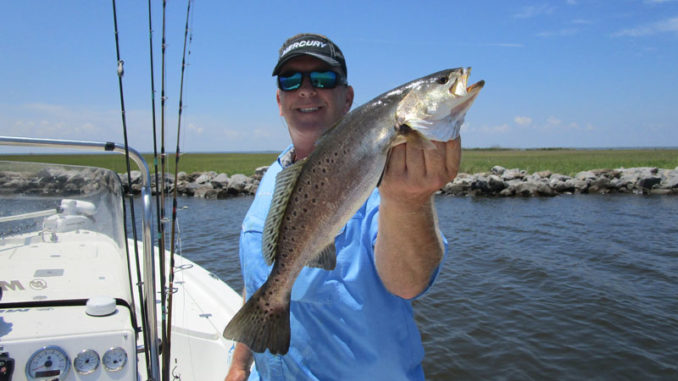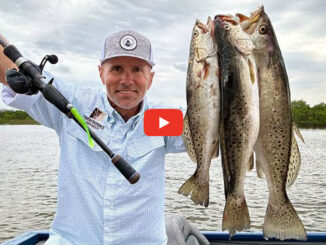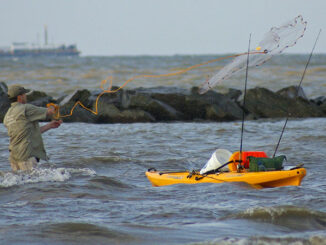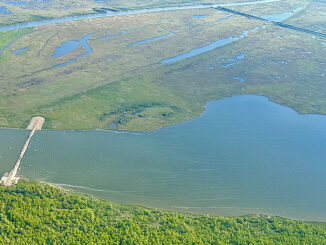
So we all know of this summer’s fishing woes. It was an awful summer for trout hunters, unless, of course, you fish to the east or west of the waters so adversely affected by the high river.
But now the spillway is closed, some saltier waters have had time to disperse much of the muddy river water, and things are trying to settle into some new kind of normal pattern.
Capt. Eric Olsen of Saltwater Therapy Charters (504-715-3006) is one of a team of several guides who pound the waters out of Shell Beach every day in pursuit of the speckled species as well as the spot-tail bronze beasts, and he said this summer was by far the worst he’s seen.
“But that’s behind us now, and that’s where we want to keep it — in the rear-view mirror,” Olsen said. “The positive prospect is for saltier water and better fishing ahead.
Transition time?
“But now we also enter into what are normally the transition months. Transition time is always challenging for anglers, but this year especially so,” he said. “The action we’re seeing right now is what we expected to see two months ago, so the spillway opening seems to have set our usual action back by a couple months. We wonder if the transition will be delayed, but I don’t think it will, at least not by much. After all, the freshwater doesn’t stop the clock or delay the arrival of fall, and I suspect their normal instincts will kick in and send them into the transition patterns as the freshwater retreats. Will complete normalcy resume? We’ll see. It’ll be a period of discovery, but you can be sure we’ll be pounding the water to find and follow them.”
September strategy
- Fringe bays. “I’ll focus on the fringe bays, all the big bodies of water on the edges,” Olsen said. “That would be Bay Eloi, The Rocks at the end of the MRGO, Lake Anastasia and up the edges of the Biloxi Marsh around Christmas Camp Lake — in that whole area. It should hold trout and reds, and live shrimp under a cork is the best bet, but the plastic bite should get better also.”
- Don’t get married to one spot. Be prepared to move around, and be prepared to travel.
“Transition trout can be one place today and somewhere else tomorrow,” Olsen said. “This is a hunt, and you can’t be lazy. Too many anglers park and shop and hope fish come along. From now through fall, you have to be more aggressive and ready to move when you’re only catching junk fish, undersize fish or nothing at all. Give it 10 minutes to produce, then move. If you’ve tried several spots in the same bay and nothing is happening, move to another body of water.”
- Try drifting. “Sometimes the fish are finicky, and they’ll only bite when you’re drifting,” Olsen said. “Somehow, your moving boat makes the bait more enticing. But if you start catching fish, stick there and see if there’s more. If nothing happens in 10 minutes, resume the drift. Also, try re-drifting that same area where you caught the previous fish.”
- Switch baits. “It’s weird, but this time of year, we’ll see fish bite only live shrimp; they won’t touch plastic,” Olsen said. “But we also see the opposite on occasion, when plastic will outfish the live stuff. So try everything — different plastics, different colors — but don’t leave the dock without live stuff in the baitwell.”
- Moving water. “Fish moving water, rising or falling, and always look for signs of bait in the water and for seagulls diving at the surface,” Olsen said. “You can usually catch keeper size specks in the fall under the birds.”
- Think big. Don’t be afraid to poke your nose out into the sound to try to find some bigger fish.
“The big specks usually still hang outside in September, and rigs and reefs and islands are definitely worth trying on calmer days,” Olsen said. “Bottom-fish with live croakers or shrimp at the rigs, and under corks or try free-lining plastics or even topwater baits at the islands for both specks and reds. I suspect they’ll be some nice sized trout in the Sound in September, so don’t hesitate to give it a shot.”


